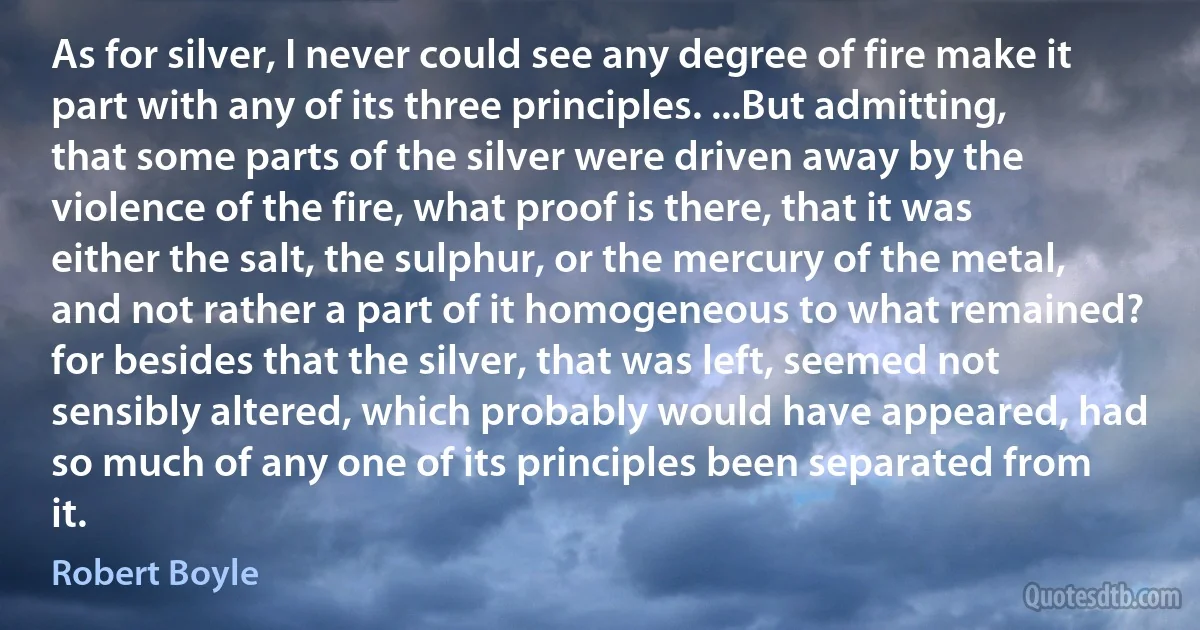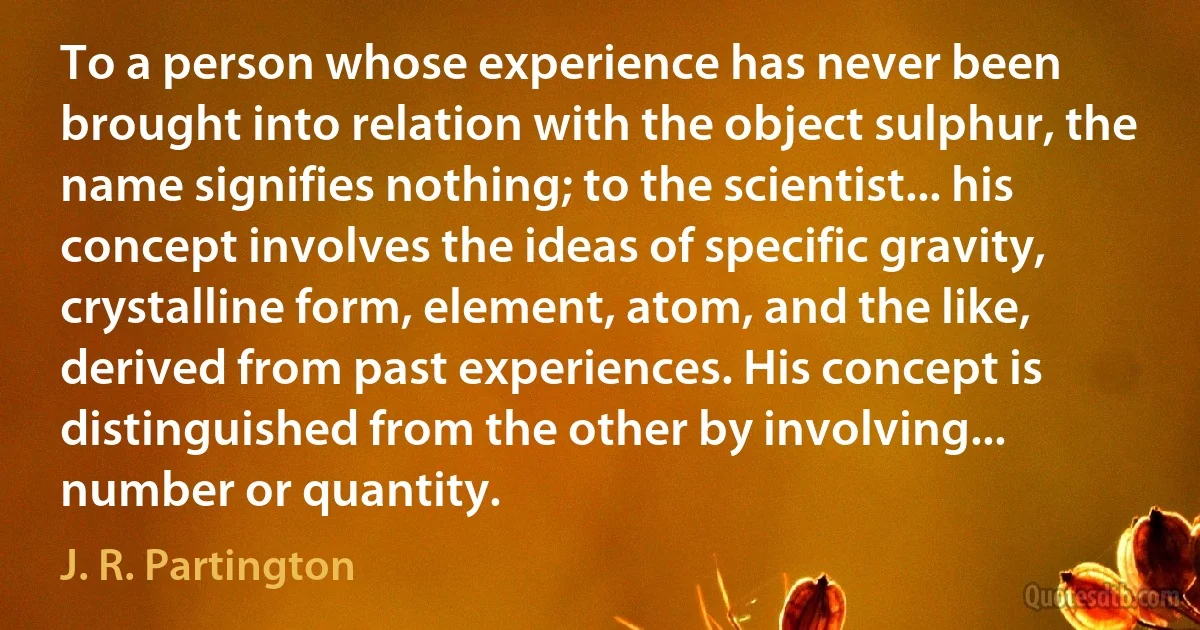Sulphur Quotes
The Devil is right at home. The Devil, the Devil himself, is right in the house. And the Devil came here yesterday. Yesterday the Devil came here. Right here. And it smells of sulphur still today. Yesterday, ladies and gentlemen, from this rostrum, the president of the United States, the gentleman to whom I refer as the Devil, came here, talking as if he owned the world. Truly. As the owner of the world.

Hugo Chávez
In one of the most brilliant papers in the English language Hume made it clear that what we speak of as 'causality' is nothing more than the phenomenon of repetition. When we mix sulphur with saltpeter and charcoal we always get gunpowder. This is true of every event subsumed by a causal law - in other words, everything which can be called scientific knowledge. "It is custom which rules," Hume said, and in that one sentence undermined both science and philosophy.

Philip K. Dick
His wastefulness showed most of all in the architectural projects. He built a palace, stretching from the Palatine to the Esquiline, which he called..."The Golden House". The following details will give some notion of its size and magnificence. The entrance-hall was large enough to contain a huge statue of himself, 120 feet high...Parts of the house were overlaid with gold and studded with precious stones and mother-of pearl. All the dining-rooms had ceilings of fretted ivory, the panels of which could slide back and let a rain of flowers, or of perfume from hidden sprinklers, shower upon his guests. The main dining-room was circular, and its roof revolved, day and night, in time with the sky. Sea water, or sulphur water, was always on tap in the baths. When the palace had been decorated throughout in this lavish style, Nero dedicated it, and condescended to remark: "Good, now I can at last begin to live like a human being!"

Suetonius
He had never been sure but that there might be something to the doctrines he had preached as an evangelist. Perhaps God really had dictated every word of the Bible. Perhaps there really was a hell of burning sulphur. Perhaps the Holy Ghost really was hovering around watching him and reporting. But he knew with serenity that all of his New Thoughts, his theosophical utterances, were pure and uncontaminated bunk. No one could deny his theories because none of his theories meant anything. It did not matter what he said, so long as he kept them listening; and he enjoyed the buoyancy of power as he bespelled his classes with long, involved, fruity sentences rhapsodic as perfume advertisements.

Sinclair Lewis
I need not tell you, what complaints the more candid and judicious of the Chymists themselves are wont to make of those boasters, that confidently pretend, that they have extracted the salt or sulphur of quicksilver, when they have disguised it by additaments, wherewith it resembles the concretes, whose names are given it; whereas by a skilful and rigid examen, it may be easily enough stripped of its disguises, and made to appear again in the pristine form of running mercury. The pretended salts and sulphurs being so far from being elementary parts extracted out of the body of mercury, that they are rather... de-compound bodies, made up of the whole metal and the menstruum, or other additaments employed to disguise it.

Robert Boyle
There are some mixt bodies, from which it has not been yet made appear, that any degree of fire can separate either salt, or sulphur, or mercury, much less all the three. The most obvious instance of this truth is gold, which is a body so fixed, and wherein the elementary ingredients (if it have any) are so firmly united to each other, that we find not in the operations, wherein gold is exposed to the fire, how violent soever, that it does discernably so much as lose of its fixedness or weight, so far is it from being dissipated into those principles, whereof one at least is acknowledged to be fugitive enough.

Robert Boyle
It is somewhat strange to me, that neither the Spagyrists themselves, nor yet their Adversaries, should have taken notice that Chymists have rather supposed than evinced, that the Analysis of bodies by fire, or even that at least some Analysis is the onely instrument of investigating what Ingredients mixt bodies are made up of, since in divers cases That may be discovered by Composition as well as by Resolution; as it may appear, that Vitriol consists of metalline parts (whether Martial, or Venereal, or both) associated by Coagulation with acid ones, one may, I say, discover this as well by making true Vitriol with Spirit (improperly called Oil) of Sulphur, or that of Salt, as by distilling or Resolving Vitriol by the fire.

Robert Boyle
Now a man need not be very conversant in the writings of Chymists to observe, in how Laxe, Indefinite, and almost Arbitrary Senses they employ the Terms of Salt, Sulphur and Mercury; of which I could never find that they were agreed upon any certain Definitions or setled Notions; not onely differing Authors, but not unfrequently one and the same, and perhaps in the same Book, employing them in very differing senses.

Robert Boyle
The metals are all essentially identical; they differ only in form. Now, the form brings out accidental causes, which the experimenter must try to discover and remove, as far as possible. Accidental causes impede the regular union of sulphur and mercury; for every metal is a combination of sulphur and mercury. A diseased womb may give birth to a weakly, leprous child, although the seed was good; the same is true of the metals which are generated in the bowels of the earth, which is a womb for them; any cause whatever, or local trouble, may produce an imperfect metal. When pure sulphur comes in contact with pure mercury, after more or less time, and by the permanent action of nature, gold is produced.

Albertus Magnus
Chemical signs ought to be letters, for the greater facility of writing, and not to disfigure a printed book ... I shall take therefore for the chemical sign, the initial letter of the Latin name of each elementary substance: but as several have the same initial letter, I shall distinguish them in the following manner:- 1. In the class which I shall call metalloids, I shall employ the initial letter only, even when this letter is common to the metalloid and to some metal. 2. In the class of metals, I shall distinguish those that have the same initials with another metal, or a metalloid, by writing the first two letters of the word. 3. If the first two letters be common to two metals, I shall, in that case, add to the initial letter the first consonant which they have not in common: for example, S = sulphur, Si = silicium, St = stibium (antimony), Sn = stannum (tin), C = carbonicum, Co = colbaltum (colbalt), Cu = cuprum (copper), O = oxygen, Os = osmium, &c.

Jons Jacob Berzelius
Wherever there exists a difference of temperature... it is possible to have also the production of impelling power. ...All substances in nature can be employed for this purpose, all are susceptible of changes of volume, of successive contractions and dilatations, through the alternation of heat and cold. All are capable of overcoming in their changes of volume certain resistances... A solid... A liquid... An aeriform fluid... If it is enclosed in an expansible space, such as a cylinder provided with a piston, it will produce movements of great extent. Vapors of all substances capable of passing into a gaseous condition, as of alcohol, of mercury, of sulphur, etc., may fulfil the same office as vapor of water. ...Most of these... have been proposed, many even have been tried, although... without remarkable success.

Nicolas Léonard Sadi Carnot
The Chinese early learned to work in metals; bronze occurs in the 11th-10th centuries B. C., useful iron from about 500 B. C. At a later period they made brass... True porcelain was first made about A. D. 600. They were probably in possession of mercury at an early date, and learnt how to decompose cinnabar into mercury and sulphur, and recompose it from these materials.

J. R. Partington
There are many persons of combative tendencies, who read for ammunition, and dig out of the Bible iron for balls. They read, and they find nitre and charcoal and sulphur for powder. They read, and they find cannon. They read, and they make portholes and embrasures. And if a man does not believe as they do, they look upon him as an enemy, and let fly the Bible at him to demolish him. So men turn the word of God into a vast arsenal, filled with all manner of weapons, offensive and defensive.

Henry Ward Beecher
There is in them a softer fire than the ruby, there is the brilliant purple of the amethyst, and the sea green of the emerald - all shining together in incredible union. Some by their splendor rival the colors of the painters, others the flame of burning sulphur or of fire quickened by oil.

Pliny the Elder
I find that even Eminent Writers (such as Raymund Lully, Paracelsus, and others) do so abuse the termes they employ, that as they will now and then give divers things one name, so they will oftentimes give one thing, many Names; and some of them (perhaps) such, as do much more properly signifie some Distinct Body of another kind; nay even in Technical Words or Termes of Art, they refrain not from this Confounding Liberty; but will, as I have Observ'd call the same Substance, sometimes the Sulphur, and Sometimes the Mercury, of a Body.

Robert Boyle



